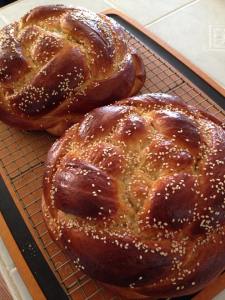Last night, we hosted our first seder in three years. These are the words that I shared at the start of our gathering. This morning, I feel proud of myself. I have put my whole heart into the task of grief work, so aptly named for the effort it requires. And though I know that journey is not over, I have marked a powerful milestone in the healing process. And today, my heart is full.
Bruchim Habaim (Welcome Guests)
This is the first Seder that we have hosted in three years. When we lived in Atlanta, our home had become the gathering place for fun, festive and lively Seders. We squeezed friends into every corner of our tiny dining room as we told the story of Pesach, sang songs, shared traditions and created beautiful and lasting memories.
But on April 20, 2015, my father took his own life and my world was forever altered.
This time of year is hard for me. When we moved to Colorado just two months after my dad’s suicide, I could barely get through any of the holidays, but Passover was one of the most difficult for me.
The symbolism & the story were riddled with triggers. I felt as if my father had died in his own personal Egypt. I was left wandering the desert of trauma, grief, guilt and a heartbreak that made it hard to breathe. If my father’s final moments on this earth left him feeling shackled, trapped in a pain that he feared would never end, a pain that left him feeling as if death were his only escape, then how could I simply leave him behind? How could I seek a promised land without abandoning him?
These were some of the questions that I grappled with. That first Passover we opened the Haggadah, and within minutes I asked that we close it. I couldn’t do it. We had a Passover dinner, but there was no Seder. The second year, I managed to get through the Haggadah, but it held no real meaning for me. I was just trying to reclaim some part of my connection to God, faith, and tradition.
These past few weeks have been full of preparations for the holiday. It is the spring cleaning of our people, the clearing out of chametz (leavened foods) from every corner of the kitchen & pantry. There is a beautiful symbolism to the process, even for those of us who hate to clean. That symbolism felt somehow more tangible for me this year, particularly as I reflected on my own journey & the grief work that has been so much a part of my life.
As I delved into the work of readying the house for Passover, the metaphors held a far greater meaning for me. I have had to dig deep, emptying off the shelves of pain, sorrow, loss, regret, and questions that will never find answers. I have sorted through the emotions, trying to figure out what I can let go of and what I can hold on to. I have stared at the empty spaces contemplating how I can fill them up, knowing that some far corners will remain forever empty. I have de-cluttered every broken piece of myself, laying them out, discovering what still fits, what never will again, and what is forever altered but still a part of me. And I have found some healing.
I have discovered that moving forward in my life, and seeking out a place of promise, is not abandoning my father. Just as Moses carried Joseph’s bones out of Egypt, I carry my father with me. I look at the salt water and the bitter herbs on the Seder plate, and I know that I will always carry sorrow, but I don’t have to carry his. I savor the sweet taste of charoset, and I remember that my father’s story, and the story that we shared together, had moments of great joy, love, and celebration as well. And I am finally able to reflect on those moments. I think of Miriam dancing when the Israelites had finally crossed the Red Sea. And I close my eyes and see my father dancing with abandon, the way he did in life and it makes me smile to remember that.
I know my journey through the valley of the shadow is not over. I know that in just a few weeks there is another painful milestone that I must get through. And I know the path is far from linear. There is no finish line, but I do not travel alone, and I have not stood still. I am not wandering without direction. One foot in front of the other, like the Israelites, I am walking toward my own Promised Land.
And so, I finally feel ready to rediscover the joy of this holiday. I feel ready to gather with friends old and new, to create memories and celebrate all that this holiday teaches us. I am grateful to all of you not only for sharing in this Seder with our family but for marking this milestone of healing with me.
Finally, I know that we all find ourselves dwelling in Egypt from time to time. We feel imprisoned by our own demons, held captive to the challenges in life that we must endure. It is easy to feel trapped, shackled, immersed in the darker moments; we lose sight of our own strength, resilience and, the wellspring of courage & fortitude that lies within. I pray that going forward we can each hold on to the hope of better days, believing even in the worst of times that, gam zeh ya’avor, this too shall pass. And with that belief in our hearts, may we each journey forward toward hope, wholeness, healing, and happiness.
Bruchim Haba’im welcome friends, we feel blessed & grateful to have you here.














